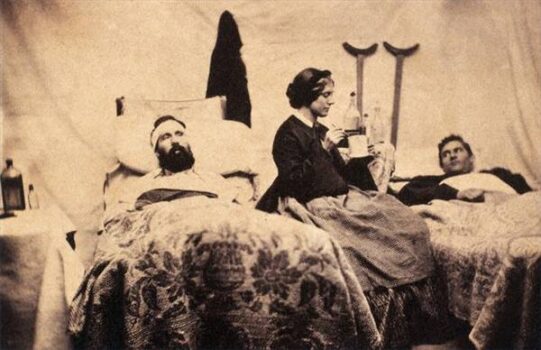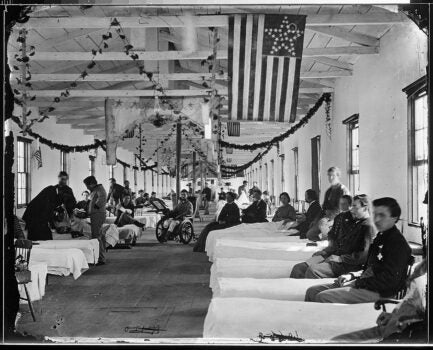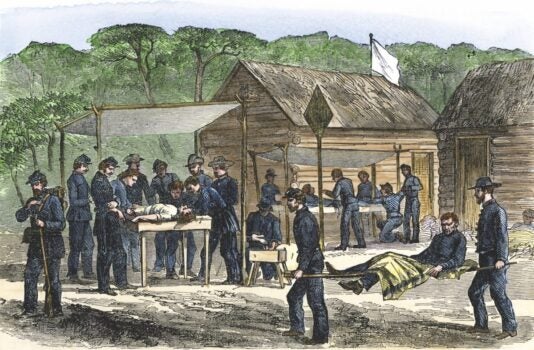Christmas in 1862 was a bleak time here
Published 5:26 pm Tuesday, December 26, 2023
By: Bryan Bush, Contributing Writer
On Oct. 2, 1862, Union forces under Gen. Don Carlos Buell moved out of Louisville with around 60,000 men, consisting of three corps. On Oct. 8, Buell’s forces fought Confederate Gen. Braxton Bragg’s Army of the Mississippi, which comprised about 16,000 men, at the Battle of Perryville. The battle resulted in a Confederate tactical victory, but a Union strategic victory, since Bragg’s forces fell back into Tennessee and the federal forces held Kentucky for the Union for the rest of the war. The battle only lasted five hours and resulted in over 7,000 causalities.
After the battle, homes, barns, warehouses and churches in Perryville, Danville, Mackville, Springfield, Bardstown and Louisville were turned into hospitals. On Oct. 23, Dr. A. N. Read, Inspector of the U.S. Sanitary Commission, left Louisville with 21 ambulances and three government wagons. The first hospital he came to was in Mackville, which was a tavern with 16 rooms. The tavern contained 150 wounded and 30 sick soldiers from a Wisconsin regiment. He wrote that from Mackville to Perryville nearly every house was a hospital. There were at least “2,500 Union and Rebel soldiers” at Perryville and Harrodsburg. “There had been almost no preparation for the care of the wounded at Perryville and as a consequence the suffering from want of help of all kinds, as well as proper accommodations of food, medicines and hospital stores was excessive.” He wrote there were “some 1,800 wounded in and about Perryville. Every house was a hospital.” In Danville, the Courthouse was packed with wounded. There was no water and no beef. The Rebel dead had been unburied and Colonel Read, along with African-Americans and Confederate sympathizers, formed a burial party that took two days to bury several hundred bodies.”
By November, conditions for the sick and wounded had improved since the battle, but there were still patients in the hospitals in Danville, Perryville and Louisville. On Nov. 14, Read wrote to Dr. J. S. Newberry, Associate Secretary U. S. Sanitary Commission stating that he had completed the purchase of the articles of diet and delicacies for the sick and wounded at Perryville and Danville and secured transportation for the soldiers. The Soldiers’ Aid Society at Cleveland had sent more goods to Perryville and Danville. Read stated that the surgeons had difficulty in performing their tasks due to the lack of water, especially in Perryville. Danville was destitute due to the Union army passing through Danville twice and Bragg’s army passing through the town once. The wells were partially filled again, but the water was brought in carts for over a mile. The town had 3,000 residents and Perryville had 300, and the area was completely destitute of water, with the Chaplin River being dry and all the wells dry and all the water used in the hospitals and by residents was brought from two springs a mile from town. The want of water had been severely felt in the management of the hospitals.
The letter stated that the wounded had been moved so that there were 700 patients remaining. Most of the patients had a comfortable bed, but no change of shirts or drawers. The mortality rate had not been as great with the federals soldiers then the Confederates. Erysipelas and Pyemia was occurring frequently. At Danville, the improvements in the sick was markedly better than Perryville. The hospitals were clean, the grounds policed and the means to cook meals had improved.
On Nov. 12, there were 925 patients and the hospitals were overcrowded. The nearest railroad was in Lebanon and the town was used as a resting place for the sick brought from Perryville and Danville, as well as permanent hospitals for the troops stationed there.
Read mentioned the female nurses in Perryville and Danville who assisted in the care of the wounded. He wrote: “They have labored systematically, certain of them agreeing to visit each hospital daily and have taken many of choice articles of diet to the suffering.” Read mentioned that the hospitals were still suffering from overcrowding and the high mortality rate. The need for government hospitals was high.
By December, there were still patients from the battle of Perryville in the hospitals. The remnants of the battle were still present on the battlefield. A. C. Sands, a United States Marshal, reported that numbers of bodies of Rebel soldiers were still left exposed to the elements. He reported that “they were buried in such shallow graves that the rains have uncovered them and the swine are now making meals of many of them.”
On Dec. 2, the Louisville Journal newspaper reported that 24 soldiers who were patients from Danville arrived in Louisville and 36 soldiers arrived in Louisville from Perryville, awaiting discharge from the army due to their wounds.
On Dec. 12, the Soldier’s Aid Society of Northern Ohio wrote that “their friends have been zealous and active the past week, and the generous receipts at our rooms given token of the interest that they feel in the work of relief. We beg they may continue their efforts, and the pleasures and the diversions of the approaching holiday season may not be suffered to conflict with their labors for the sick and wounded soldiers. We are glad to know that the young people of many towns are active in planning entertainments of various kinds for the benefit of the local Aid Societies.” On Dec. 15, there were still 19 soldiers from the 105th Ohio Infantry in the hospitals at Perryville.
During the month of December, patients were still dying in the hospitals. On Dec. 6, word reached the Appleton Crescent newspaper in Wisconsin, of the death of R. A. Pearse, of Company D, 21st Wisconsin Infantry. Senator Hudd of Wisconsin wrote that Pearse “did gallant service in the battle of Perryville, became completely exhausted in consequence thereof; was attacked with typhoid fever; and died, no doubt, from sheer neglect, being without food or shelter for five consecutive days! Great God, what treatment to our brave men.”
On Dec. 16, in Harrodsburg, Col. Charles H. Daniel, 41st Georgia Infantry, Lt. Col. Evans, of the 8th Texas Cavalry, Terry’s Texas Rangers, Captain W. M. Irion, 32nd Mississippi Infantry, Capt. S. F. Sherrill, 57th Tennessee Infantry, Lt. T. Sheehee, 3rd Florida Infantry and Dr. John S. Wright, 41st Georgia had died.
In the Louisville hospitals, the patients occupying the beds were from the Battle of Perryville and new arriving patients from Confederate Gen. John Hunt Morgan’s Christmas Raid. On Christmas Day, nearly all the hospitals in Louisville had an extra set up for the Union and Confederate patients. According to a diary written by a Union soldier, while he was a patient from Hospital Number 1 in Louisville, several ladies, under Mrs. Davis, Mrs. Gardner and Mrs. Thomas Osborne “made a fine dinner. At least it was fine for us. There wasn’t turkey and chickens enough for all, so it was given to those who couldn’t get out and the rest of us took what was left, and it was plenty. At night someone sneaked in a bottle or two and some of the men had been in town, consequently there was a good deal of racket and noise but on account of it being Christmas Dr. Strew let it pass.”
There can be no dispute that Christmas in Perryville and Danville in 1862 was a bleak occasion. Wounded soldiers were still in town. The town’s cattle, hogs, wood, corn and water had been taken by the retreating Confederates and the Union army that stayed after the battle also used valuable resources. Houses were still used as hospitals. Many of the brave fathers and sons in Danville and Perryville were off fighting in the war, and the families had to deal with the longing for loved ones who were in far-off battlefields and many of them still had wounded soldiers in their homes. Water and food were scarce. The scars of the battle remained fresh during that bleak Christmas. In this joyous holiday season, let us not forget the suffering that occurred in the December of 1862, and remember those soldiers today who still who are overseas protecting our country.









